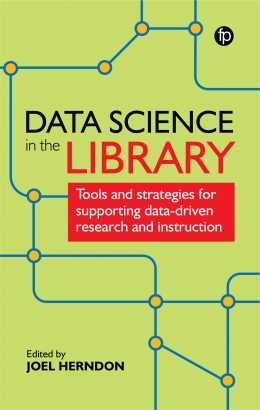
Primary tabs
You don't need to be an ALA Member to purchase from the ALA Store, but you'll be asked to create an online account/profile during checkout to proceed. This Web Account is for both Members and non-Members. Note that your ALA Member discount will be applied at the final step of the checkout process.
If you are Tax-Exempt, please verify that your account is currently set up as exempt before placing your order, as our new fulfillment center will need current documentation. Learn how to verify here.
- Description
- Table of Contents
- About the author
- Reviews
In the last decade, data science has generated new fields of study and transformed existing disciplines. As data science reshapes academia, how can libraries and librarians engage with this rapidly evolving, dynamic form of research? Can libraries leverage their existing strengths in information management, instruction, and research support to advance data science?
Data Science in the Library: Tools and Strategies for Supporting Data-Driven Research and Instruction brings together an international group of librarians and faculty to consider the opportunities afforded by data science for research libraries. Using practical examples, each chapter focuses on data science instruction, reproducible research, establishing data science services and key data science partnerships.
This book will be invaluable to library and information professionals interested in building or expanding data science services. It is a practical, useful tool for researchers, students, and instructors interested in implementing models for data science service that build community and advance the discipline.
PART 1: DATA SCIENCE AND RESEARCH LIBRARIES – PERSPECTIVES
Sustainability and Success Models for Informal Data Science Training within Libraries
Elizabeth Wickes
The Fundación Juan March DataLab: A Data Science Unit within a Research Support Library
Luis Martínez-Uribe, Paz Fernández and Fernando Martínez
PART 2: DATA SCIENCE INSTRUCTION
Toward Reproducibility: Academic Libraries and Open Science
Joshua Quan
Start with Data Science
Mine Çetinkaya-Rundel
PART 3: DATA SCIENCE SERVICES
In Support of Data-Intensive Science at the University of Washington
Jenny Muilenburg
From a Data Archive to Data Science: Supporting Current Research
Tim Dennis, Zhiyuan Yao, Leigh Phan, Kristian Allen, Jamie Jamison, Doug Daniels and Ibraheem Ali
PART 4: DESIGNING AND STAFFING DATA SCIENCE
In-House Training as the First Step to Becoming a Data Savvy Librarian
Jeannette Ekstrøm
Designing for Data Science: Planning for Library Data Services
Joel Herndon
Joel Herndon
Joel Herndon leads Duke Libraries' Data and Visualization Services, a consulting and training service providing support for data science, data management, data visualization, digital mapping, and data analysis. His recent research considers the evolution of data management requirements in social science journals and how research libraries can provide consultation and training to meet those requirements (Herndon and O'Reilly, 2016). He has a strong interest in how libraries engage with their communities in digital research and training. Recent projects include leading the launch of the Edge research space in Duke Libraries, active involvement in Duke's DataFest competitions, and serving as a principal investigator on the Data Curation Network.
Have you read this book? Leave a review!
”These [case studies] offer important insights into how libraries developed staffing and expertise, provisioned infrastructure, provided services and instruction, and—most important—collaborated with other units on campus and with organizations outside their institutions ... In sum, this book will be useful to a wide variety of libraries and librarians, whether or not they have launched their own data science initiatives.”
— Choice


